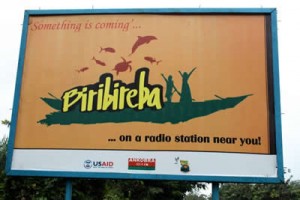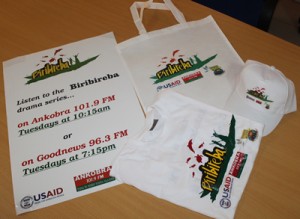So begins the catchy theme song of the hit radio program, Biribireba, now in its third year of broadcasting across the airwaves of Ghana with the lofty goal of changing coastal communities. The radio drama addresses a wide variety of issues from fisheries to family planning in a humorous, interactive way that educates while entertaining. As one taxi driver attested, “Surely, every Tuesday evening I try not to miss any episode. It is very educative, especially the aspect that talks about illegal and dynamite fishing. I wish by the time the program ends, all fishermen practicing illegal fishing will put a stop to it.”

According to a 2009 survey, radio is the most widely accessible and used source of news and information for Ghanaians. Ninety percent of respondents surveyed said they had listened to the radio in the last week and virtually all said they tune in on a weekly basis for news and information. These results verify that radio is a great way to deliver development information. And reaching communities with information about sustainable resource management is imperative, as the country’s population is set to double in the next 20 years, which will result in increased pressure on fisheries and other resources.
Biribireba is part of a larger sustainable development program, Hɛn Mpoano. Hɛn Mpoano, means Our Coast in Fante, the local language of Ghana, and is a five-year program funded by the United States Agency for International Development (USAID) in partnership with the Coastal Resources Center (CRC) of the University of Rhode Island, PCI-Media Impact through SustainaMetrix, Friends of the Nation Ghana and the World Fish Center. Hɛn Mpoano is a community campaign designed to support an integrated approach to ecosystem governance and sustainable management of coastal resources in six coastal districts and inshore fishing grounds of Ghana’s Western Region.
During the first year of Hɛn Mpoano, partners and community members, including a chief fisherman and a fishmonger, gathered to envision mechanisms for maintaining and enhancing coastal regions. Biribireba script writers drew upon the Ghanaian tradition of storytelling, building upon local legends to craft a persuasive story line set in the fishing community of Biribireba. Like all dramas, Biribireba is filled with intrigue, corruption, temptation, chaos and love. But unlike most, Biribireba is also infused with important social and environmental messages.

The team designed t-shirts and flashy billboards announcing the launch of the radio soap opera on three local FM radio stations and the show premiered to 2.5 million listeners in 2011 across the six districts of Western Ghana. To reach its intended audience, the drama was produced in both Fante and English and broadcast on Tuesdays, as fishermen do not go to sea that day because they believe they may encounter the water gods, which can lead to an untimely death.
Listeners tune in weekly to the twists and turns of the soap opera and each episode of the drama is broadcast inside of a talk show designed to promote listener feedback and comments on the environmental themes. In this way, citizens take both a passive and active role in changing their own knowledge, attitudes, and behavior. A recent survey confirmed that the 52 episodes of Biribireba aired to date have, indeed, increased awareness about community, environment, and fisheries issues for coastal dwellers in the Western region of Ghana. Ebo Hackman, Biribireba host on Radio Sharma says, “The program should have come on long ago. It has increased our listenership and I hope it will run for a long time.” As one caller remarked, “The program is full of humor and that makes it interesting because as we laugh, we learn.”


